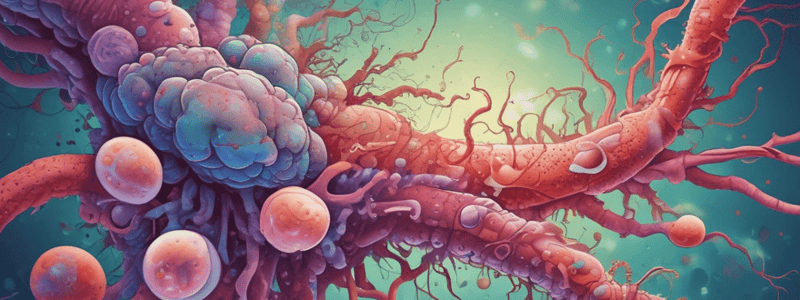Podcast
Questions and Answers
What is the main difference between coagulase-negative Staphylococcus epidermidis and coagulase-positive S. aureus?
What is the main difference between coagulase-negative Staphylococcus epidermidis and coagulase-positive S. aureus?
- Coagulase-positive is less virulent
- Coagulase-positive can enter the body through natural openings (correct)
- Coagulase-negative is more pathogenic
- Coagulase-negative is more resistant to antibiotics
Which of the following is a type of acne characterized by inflammatory papules and pustules?
Which of the following is a type of acne characterized by inflammatory papules and pustules?
- Impetigo
- Seborrheic dermatitis
- Folliculitis
- Acne vulgaris (correct)
What is the primary mode of transmission of impetigo?
What is the primary mode of transmission of impetigo?
- Airborne transmission
- Vector-borne transmission
- Direct contact (correct)
- Contaminated food and water
Which of the following bacteria is commonly associated with streptococcal skin infections?
Which of the following bacteria is commonly associated with streptococcal skin infections?
What is the name of the yeast that is associated with the scaling skin condition known as dandruff?
What is the name of the yeast that is associated with the scaling skin condition known as dandruff?
What is the name of the bacteria that produces propionic acid, which helps maintain the low pH of the skin?
What is the name of the bacteria that produces propionic acid, which helps maintain the low pH of the skin?
What is the primary route of entry for the pathogen that causes impetigo?
What is the primary route of entry for the pathogen that causes impetigo?
What is the characteristic of bullous impetigo?
What is the characteristic of bullous impetigo?
What is the primary cause of inflammatory acne?
What is the primary cause of inflammatory acne?
What is the characteristic of erysipelas, a type of streptococcal skin infection?
What is the characteristic of erysipelas, a type of streptococcal skin infection?
What is the primary cause of viral warts?
What is the primary cause of viral warts?
What is the characteristic of nodular cystic acne?
What is the characteristic of nodular cystic acne?
How does the tetanus neurotoxin affect the muscles?
How does the tetanus neurotoxin affect the muscles?
What is the primary mode of transmission for poliomyelitis?
What is the primary mode of transmission for poliomyelitis?
What type of bacteria causes botulism?
What type of bacteria causes botulism?
What is the effect of the botulinal toxin on the nervous system?
What is the effect of the botulinal toxin on the nervous system?
What is the characteristic symptom of tetanus?
What is the characteristic symptom of tetanus?
What is the prevention method for tetanus?
What is the prevention method for tetanus?
What is the mortality rate of Haemophilus influenzae Meningitis?
What is the mortality rate of Haemophilus influenzae Meningitis?
Which of the following bacteria is a gram-positive, encapsulated diplococcus?
Which of the following bacteria is a gram-positive, encapsulated diplococcus?
What is the mode of transmission for Neisseria meningitidis Meningitis?
What is the mode of transmission for Neisseria meningitidis Meningitis?
What is the primary habitat of Listeria monocytogenes?
What is the primary habitat of Listeria monocytogenes?
Which of the following is a common inhabitant of the nasopharyngeal region?
Which of the following is a common inhabitant of the nasopharyngeal region?
What is the primary treatment for Neisseria meningitidis Meningitis?
What is the primary treatment for Neisseria meningitidis Meningitis?
What is the primary characteristic of Listeria monocytogenes that allows it to grow at low temperatures?
What is the primary characteristic of Listeria monocytogenes that allows it to grow at low temperatures?
Flashcards are hidden until you start studying
Study Notes
Bacterial Skin Infections
- Staphylococcal skin infections:
- Caused by Staphylococcus aureus, a coagulase-positive bacterium
- Can enter the body through natural openings such as hair follicles and cause folliculitis or furuncles
- Impetigo is a type of staphylococcal skin infection, mostly affecting children aged 2-5 years
- Symptoms: fever, headache, stiff neck, nausea, and vomiting
- Treatment: Cephalosporins, vancomycin
- Streptococcal skin infections:
- Caused by Streptococcus pyogenes, a Group A beta-hemolytic streptococcus
- Can cause impetigo and erysipelas
- Erysipelas can cause sepsis
- Necrotizing fasciitis is a serious complication of streptococcal skin infections
- Streptococcal toxic shock syndrome can cause bacteremia and organ damage
Viral Skin Infections
- Warts:
- Caused by Papillomavirus
- More than 50 types of papillomavirus can cause different types of warts
- Incubation period: several weeks
- Treatment: cryotherapy, electrodesiccation, and salicylic acid
- Smallpox:
- Caused by Orthopoxvirus
- Variola major has a mortality rate of 20-60%, while variola minor has a mortality rate of less than 1%
- Transmitted by the respiratory route
- Eradicated in 1977 by vaccination
- Chickenpox:
- Caused by Varicellazoster virus (human herpesvirus 3)
- Transmitted by the respiratory route
- Causes pus-filled vesicles
- Lesions on the face, lower back, chest, and shoulders
- Prevention: Live attenuated vaccine
- Herpes Simplex:
- Caused by Human herpesvirus 1 (HSV-1) and 2 (HSV-2)
- Causes cold sores and fever blisters
- Herpes gladiatorum is a common manifestation among wrestlers
- Herpes encephalitis can occur
- HSV-1 can remain latent in trigeminal nerve ganglia
Microbial Diseases of the Eye
- Conjunctivitis:
- Inflammation of the conjunctiva
- Haemophilus influenzae is the most common bacterial cause
- Viral conjunctivitis is usually caused by adenoviruses
- Swimming pool conjunctivitis is caused by Chlamydia trachomatis
- Trachoma is an eye infection caused by Chlamydia trachomatis
- Herpetic Keratitis:
- Caused by Herpes Simplex virus type 1
- Acanthamoeba Keratitis is caused by an ameba found in fresh water, tap water, hot tubs, and soil
Infectious Diseases of the Nervous System
- Tetanus:
- Caused by Clostridium tetani
- Obligately anaerobic, endospore-forming, gram-positive rod
- Growth in deep wounds
- Prevention: vaccination
- Treatment: tetanus immune globulin
- Botulism:
- Caused by Clostridium botulinum
- Obligately anaerobic, endospore-forming, gram-positive rod
- Found in soil and many aquatic sediments
- Food poisoning occurs in anaerobic environments, such as sealed cans
- Intoxication occurs from ingesting botulinal toxin
- Toxin blocks release of neurotransmitter acetylcholine, causing flaccid paralysis
- Poliomyelitis:
- Caused by Poliovirus
- Transmitted by ingestion
- Initial symptoms: sore throat and nausea
- Viremia may occur, and if persistent, the virus can enter the CNS and cause destruction of motor cells and paralysis
Normal Microbiota of the Skin
- The epidermis is the thin outer portion of the skin, composed of several layers of epithelial cells
- The dermis is the inner, relatively thick portion of skin, composed mainly of connective tissue
- Normal microbiota of the skin includes:
- Staphylococcus epidermidis
- Staphylococcus aureus
- Micrococcus species
- α-Hemolytic and nonhemolytic streptococci
- Corynebacterium species
- Propionibacterium species
- Peptostreptococcus species
- Acinetobacter species
- Small numbers of other organisms (Candida species, Pseudomonas aeruginosa, etc.)
Acne
- Classification of acne:
- Comedonal (mild) acne: caused by blocked sebum channels with shed cells
- Inflammatory (moderate) acne: caused by Propionibacterium acnes
- Nodular cystic (severe) acne: characterized by nodules or cysts filled with pus
- Treatment of acne:
- Azelaic acid
- Salicylic acid preparations
- Retinoids (derivatives of vitamin A)
- Isotretinoin for severe acne
Studying That Suits You
Use AI to generate personalized quizzes and flashcards to suit your learning preferences.




